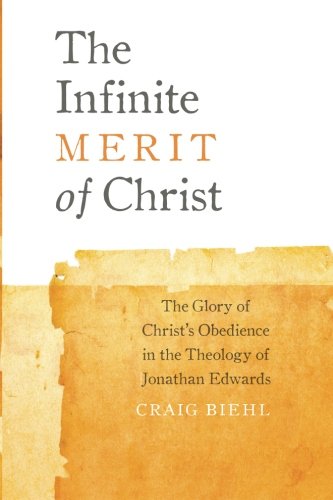Jonathan Edwards (1703-58) has remained a figure of towering significance in historical theology, but his influence has surged again in recent years – and for good reason. Our friend Dr. Craig Biehl is an avid student of Edwards, and he’s with us today to talk about his very timely work, The Infinite Merit of Christ: The Glory of Christ’s Obedience in the Theology of Jonathan Edwards.
Books At a Glance (Fred Zaspel):
For any of our readers who may not be well acquainted with Jonathan Edwards, perhaps you could introduce him for us. Who was he? And in what ways was (and is) he important?
Biehl:
 An 18th Century pastor, scholar, and the third president of Princeton University (then the College of New Jersey), Mr. Edwards is considered by many to be the greatest of American theologians, and one of the greatest theologians of all time. The depth and breadth of his theological writings is enormous, including numerous seminal works, with many considered the definitive work on a given topic (to wit, The Religious Affections, Freedom of the Will, Original Sin, True Virtue, et al). Contemporaries of Edwards found him to be a rare combination of piety, humility, and brilliance, as he was captivated by a profound love and understanding of the infinite excellence of God as displayed in all His works, and most clearly in the person and work of Jesus Christ. Reading Edwards provides a rich theological education in a deep and inspiring encounter with the beauty and excellence of God, and a firm, comprehensive, and coherent foundation for right and God-honoring thinking and living. Few writers have as much to offer contemporary Christians than Jonathan Edwards, while his contribution to the historical progress of biblical and systematic theological understanding and the Christian life is enormous.
An 18th Century pastor, scholar, and the third president of Princeton University (then the College of New Jersey), Mr. Edwards is considered by many to be the greatest of American theologians, and one of the greatest theologians of all time. The depth and breadth of his theological writings is enormous, including numerous seminal works, with many considered the definitive work on a given topic (to wit, The Religious Affections, Freedom of the Will, Original Sin, True Virtue, et al). Contemporaries of Edwards found him to be a rare combination of piety, humility, and brilliance, as he was captivated by a profound love and understanding of the infinite excellence of God as displayed in all His works, and most clearly in the person and work of Jesus Christ. Reading Edwards provides a rich theological education in a deep and inspiring encounter with the beauty and excellence of God, and a firm, comprehensive, and coherent foundation for right and God-honoring thinking and living. Few writers have as much to offer contemporary Christians than Jonathan Edwards, while his contribution to the historical progress of biblical and systematic theological understanding and the Christian life is enormous.
Books At a Glance:
Summarize for us the thesis of your book. What is significant about Edwards’ teaching in this regard?
Biehl:
In the accomplishment of God’s ultimate purpose to display and communicate the infinite excellence of His perfections (His glory), Christ voluntarily satisfied the strict requirements of God’s unchanging rule of righteousness that requires perfect obedience to obtain eternal life. In His perfect obedience to the Father, in suffering infinite wrath to pay the infinite debt of the infinitely unworthy, Christ earned for His bride infinite merit and the infinite reward required by God’s perfect justice. United to Christ by faith, Christ’s righteousness and infinite merit are imputed to the believer who is thereby made righteous by the standard of God’s justice and rewarded according to that same justice. In all of this, God’s infinite excellence is both displayed and communicated to those united to Christ by faith.
Edwards skillfully demonstrates the intimate relationship of the Gospel of Christ to the Trinity, creation, and the history of God’s dealings with his people. He knits the various biblical threads together in such a marvelous tapestry that compromise on a single point of the Gospel distorts the display of God’s glory as He designed it to be exhibited in creating and redeeming us.
Books At a Glance:
How is this important for us in today’s theological conversation? What is the contribution you hope to make here?
Biehl:
Ongoing debates on justification need Edwards for the sophistication and depth of his arguments and for placing justification in its proper relationship to all of the great Christian doctrines. Justification is too often treated in isolation from the other mutually interdependent truths of Scripture. When we begin with the ultimate purpose of the Triune God in creation and redemption, in light of the strict and unchanging requirement of God’s rule of righteousness for eternal life, many errant views of justification become untenable without an entire re-write of God’s eternal purpose to display and communicate His glory. In Christ’s satisfying both the positive (obedience) and negative (death as payment for sin) requirements of God’s justice, and as those requirements are unchanging, all views of justification that compromise the doctrine of justification by faith alone, such as the so-called (and not very new) “New Perspective on Paul,” become untenable. Imputation is no strange thing, but rather the righteousness and rewards accomplished and earned by the Groom given to His bride in the bond of marriage, in their union of love by faith.
My desire is that Edwards’ arguments in The Infinite Merit of Christ will help elevate discussions of justification to include the unity of justification to the ultimate purpose of God as Triune, and the comprehensive scope of His purpose in creation and the redemption of the bride of Christ. Moreover, that justification will be more clearly seen as the outward manifestation of the internal glory of the Trinity, with errant views of justification rightly understood as an affront to God’s perfections and the extent to which He went to maintain and display their perfect glory in saving unworthy sinners, as Edwards maintains. I have attempted to let Edwards speak for Himself without the ecumenical or other agendas wrongly superimposed on him by some of the more prolific Edwards scholars.
And most of all, may Edwards’ exposition of the infinite excellence of God in the person and work of Christ saving unworthy sinners, in purchasing for them an infinite and eternal reward, be a great blessing, joy, and encouragement to His bride.
Books At a Glance:
Are there other areas of Edwards that still deserve further exploration like this?
Biehl:
As noted in my brief history of Edwards’ interpretation in the introduction of the book, the history of Edwards interpretation contains a heavy dose of literature molding Edwards to modern sensibilities, or enlisting him for various theological agendas. The great need is for interpretations of Edwards according to Edwards’ own theological commitments, in the context in which he wrote his great works, and according to his theological priorities. In light of this, studies of Edwards’ understanding of various key topics of systematic theology deserve further exploration. Moreover, the publishing of Edwards’ Blank Bible further supports work on Edwards’ exposition of books of the Bible. Also, in the interaction of Edwards’ great theological treatises and his sermons is an almost inexhaustible wealth of material to be explored, including the application of Edwards’ deep theological insights to the Christian’s daily walk of faith and piety. Edwards wrote with the understanding that the life and doctrine of believers is integral to God’s ultimate purpose to display and communicate His glory. Also, works like Freedom of the Will and True Virtue, et al, are highly technical, but rich in application to the Christian life when understood and applied. Much work could be done here.
In Edwards’ writings are a seemingly inexhaustible fount for further exploration and exposition, for which the church will be greatly blessed.
Books At a Glance:
Many people find Edwards’ works daunting. If someone wanted to start reading Edwards, where would be some good places to begin?
Biehl:
A great place to start is his sermons. (They can be easily accessed and searched at www.Edwards.yale.edu.) Edwards wrote and preached to his congregation that they might grasp and apply profound theological truth. Nonetheless, to the modern reader they might initially appear daunting, though far less than his theological treatises. He wrote in 18th Century English and could maintain the logic of a single thought for paragraphs or even pages, something to which modern readers are less accustomed. Yet, one can easily adapt to his style, while reading Edwards is well worth the effort and pays the rich dividend of a greater view of the infinite excellence of God.
Books At a Glance:
Tell us about any other work you’ve done on Edwards that we might want to read.
Biehl:
My Reading Religious Affections provides an outline and study guide for anyone wishing to study Edwards classic work on the nature and marks of the Holy Spirit’s work in a true believer. Edwards’ treatment of the topic is sorely needed today. Designed as a resource for individual study, small groups, and the classroom, this study guide can help readers grasp and benefit from his arguments.
Books At a Glance:
Do you have any further publishing plans – on Edwards or otherwise?
Biehl:
God the Reason: The Divine Perfections as the Source of Life, Thought, and Unbreakable Faith will be published in the Spring of 2015 (God willing). God the Reason presents the perfections of God and their implications for a comprehensive, coherent, and defensible Christian worldview, while exposing the irrational blind faith of the most sophisticated arguments of unbelief. The infinite excellence of God provides the basis of our joy, love, and faith in Christ, and an accessible, effective, and God-honoring defense of the authority of Scripture and Christian faith. The heavy influence of Edwards, Van Til, and Schaeffer can be seen throughout, while the content is written and illustrated for both a general Christian audience and the classroom. God the Reason provides much of the content for the Unbreakable Faith course to be offered through PilgrimsRock.com in the Spring of 2015.

